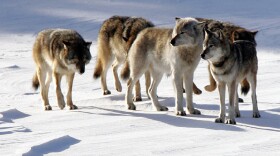Michigan's wolf population remains stable at about 630 wolves, and there are no plans for a harvest season for wolves in the state. These were some of the conclusions drawn by Michigan's Natural Resources Commission and Department of Natural Resources (DNR) wildlife biologists at a recent meeting in Lansing to discuss Michigan's wolves.
Wolves are federally protected under the Endangered Species Act. They would have to be removed from the endangered list to be hunted in Michigan.
Amy Trotter is the Chief Executive Officer of the Michigan United Conservation Clubs (MUCC). She said wolves don’t belong on the federal endangered species list.
“Wolves are a game species in Michigan and they are fully recovered, and have been for more than 20 years. They were removed from the state endangered species list back in 2009. We’ve considered them in the state to be not endangered for quite some time,” Trotter added.
Proponents of a wolf hunt say that wolves kill livestock and deer that could otherwise be harvested by hunters. Opponents say wolves are vital to the ecosystems they inhabit and are culturally significant to tribes and loved by many Michiganders.
Rolf Peterson is a professor emeritus of wildlife ecology at Michigan Technological University and has studied wolves in Michigan for decades. He said they are among the most divisive species in the state.
“They’re either completely hated or just loved. It’s often a rural-urban divide, because urban folks don’t have to live with them and they tend to like them, and rural folks have more immediate concerns, often involving domestic animals,” Peterson said.
Peterson explained that livestock attacks by wolves in Michigan aren't as frequent as those in Wisconsin or Minnesota, and that attacks on pets are mostly on bear or rabbit hounds that are actively hunting or training in wolf territory.
“I would have to struggle to come up with a really good reason to hunt wolves in Michigan. If you really want to reduce wolf density, you have to declare all-out-war; kill a major portion of the wolf population every year. That brings along some unintended consequences like lots of dispersing wolves, and it’s usually dispersing wolves that walk into domestic or human-dominated areas,” Peterson explained.
Amy Trotter said that wolves should be managed like other game species in the state, such as elk and deer.
“MUCC supports hunting and trapping as management tools for our wildlife. These need to be regulated, they need to be biologically sound, and we need to ensure that places are protected from overharvest. This should not be built on what is popular or socially acceptable. We’re talking about legal hunting and trapping methods in order to manage a wildlife species that is deemed a game species here in our state,” Trotter said.
Brian Roell, a wildlife biologist with the DNR, said that in all the debate over whether or not to have a wolf harvest season in Michigan at some point, the victory of their recovery in the region is often forgotten.
“It’s unfortunate that it’s not being celebrated that a species — particularly a large carnivore that was on the brink of extinction — has been brought back through sound scientific wildlife management to stable populations in three Great Lakes states,” Roell said.








